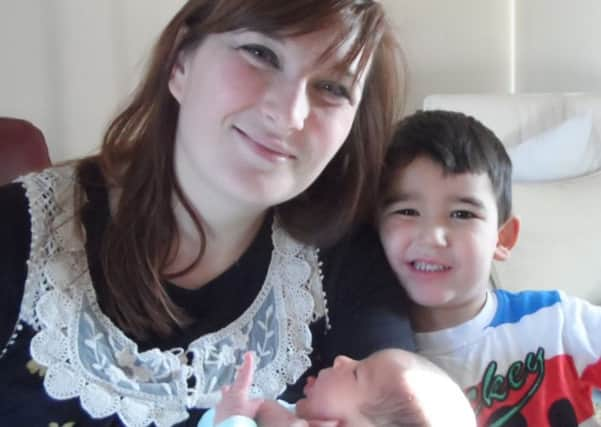Mental trauma of a new mum


Having her first baby should have been one of the happiest times of her life for Hannah Bisset.
Hannah, 36, from Thirsk, had a straightforward pregnancy and gave birth to her first baby after an emergency c-section in 2009.
Advertisement
Hide AdAdvertisement
Hide AdBut soon after she started to have irrational, racing thoughts and her behaviour became very strange. Her community midwife referred her to her GP.
Things worsened and few days later, Hannah was referred to a psychiatrist however, she was incorrectly diagnosed with post natal depression.
Hannah’s condition quickly deteriorated and she was sectioned in a general psychiatric ward, separated from her son.
It was then that Hannah was finally correctly diagnosed with postpartum psychosis.
Advertisement
Hide AdAdvertisement
Hide AdPostpartum Psychosis (PP) is a severe mental illness which begins suddenly following childbirth.
More than 1,400 women experience PP each year in the UK – one to two in every 1000 mothers.
An episode of PP can be very frightening for women and their families. Most women go on to make a full recovery, however the journey to full recovery can be long and difficult..
“I was confused as there was no history of mental illness in my family,” explains Hannah.
Advertisement
Hide AdAdvertisement
Hide Ad“Developing PP was a complete shock and extremely traumatic.”
Hannah spent two distressing weeks in the general psychiatric ward until a bed became available in a specialist mother and baby unit where she stayed for three month.
After eventually returning home, Hannah suffered extreme anxiety and lost a lot of confidence which took time to rebuild.
“What should’ve been a joyful time with my new baby was terrifying and extremely stressful, not just for me, but for my family too,” she says.
Advertisement
Hide AdAdvertisement
Hide AdTwo years ago Hannah felt pregnant with her second child, and was worried the PP may well return.
But her worries were unfounded.
“I had my second child in 2013 with a care plan in place but thankfully I didn’t get PP again.”
Hannah who is now back to normal is urging other mothers to seek help.
“My message to others is, with the right support – from family, friends and professionals – you will get better,” says Hannah.
Advertisement
Hide AdAdvertisement
Hide AdAnd she is also backing a bid from the charity which helped her to win this year’s National Lottery Awards in the Best Health Project category.
Action on Postpartum Psychosis is hosted by the University of Birmingham Medical School. APP helps research into the causes of Postpartum Psychosis; develops public and patient information; offers online peer support for recovering women and partners; educates the public and health professionals, and campaigns to improve services. If they win they would receive £2,000 and raise the profile of PP.
Hannah adds: “We desperately need more investment to raise awareness and more mother and baby units for women to access.”
Postpartum Psychosis (PP) is a severe mental illness which begins suddenly following childbirth. Over 1400 women experience PP each year in the UK (one to two in every 1,000 mothers Action on Postpartum Psychosis (APP), a collaborative project run by women with PP, healthcare professionals and academics has been shortlisted in this year’s National Lottery Awards in the Best Health Project category for the work they do to support women and their families all around the country who suffer from PP. To vote for APP to win the award visit http://bit.ly/vote4mums today.